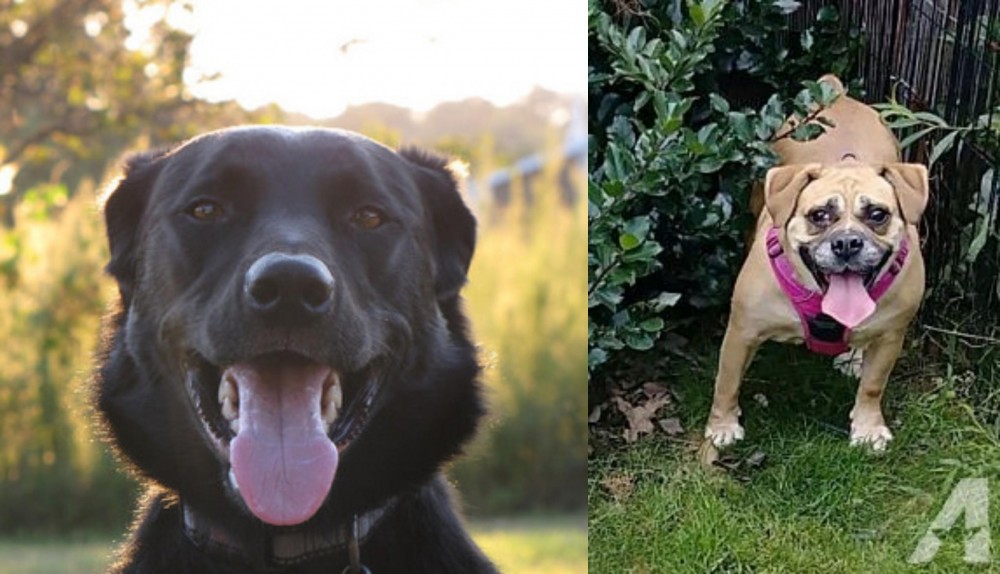 Both Borador and Beabull are originated from United States. Borador may grow 17 cm / 7 inches higher than Beabull. Borador may weigh 13 kg / 29 pounds more than Beabull. Borador may live 4 years more than Beabull. Borador may have more litter size than Beabull. Both Borador and Beabull requires Moderate Maintenance.
Both Borador and Beabull are originated from United States. Borador may grow 17 cm / 7 inches higher than Beabull. Borador may weigh 13 kg / 29 pounds more than Beabull. Borador may live 4 years more than Beabull. Borador may have more litter size than Beabull. Both Borador and Beabull requires Moderate Maintenance.
Basic Information
Group:
Working dog
Companion dog
undefined
United States
United States
Life Span:
12 - 15 Years
8 - 11 Years
Other Names:
Border collie Lab mix, Border Lab mix, Collie lab mix
None
Colors Available:
Black, black and white, beige
white, brown brindle
Coat:
short and dense or long and wavy
have short, coarse hair that tends to shed a lot
Shedding:
Moderate
Constant
Temperament:
Affectionate, Alert, Cheerful, Courageous, Curious, Energetic, Friendly, Gentle, Independent, Lively, Loving, Loyal, Outgoing, Playful, Responsive, Social, Sweet
Independent, Loving, Loyal, Playful
Grooming:
Moderate Maintenance
Moderate Maintenance
Trainability:
Easy
Moderate
New Owners Friendly:
Yes
Yes
History
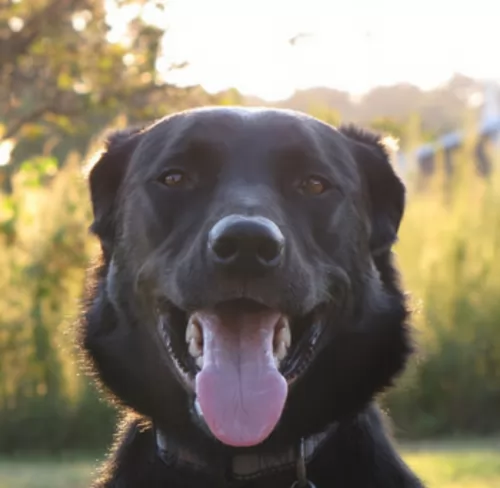 Hybrid breeds have become popular in the last decade or so. The Borador, hailing from Northern America, is one of these popular crossbreeds between two very popular dog breeds - the Border Collie and the Labrador Retriever. Between the two dog breeds, you get extraordinary intelligence, energy and a wonderful temperament.
Hybrid breeds have become popular in the last decade or so. The Borador, hailing from Northern America, is one of these popular crossbreeds between two very popular dog breeds - the Border Collie and the Labrador Retriever. Between the two dog breeds, you get extraordinary intelligence, energy and a wonderful temperament.
You first started hearing about this dog breed in the early 21st century. However each of the two breeds brought together to produce the Borador have got reasonable lengthy histories.
The Beabull is known as a designer breed rather than a purebred. The Beabull is a cross between a Beagle and an English Bulldog. This breed is a loving dog, playful and physically strong. They are independent and can be stubborn. Their origins are not well documented, but it is thought they were developed about 20 years ago. Although not recognized by the American Kennel Club because they are not purebred dogs
Description
His Looks
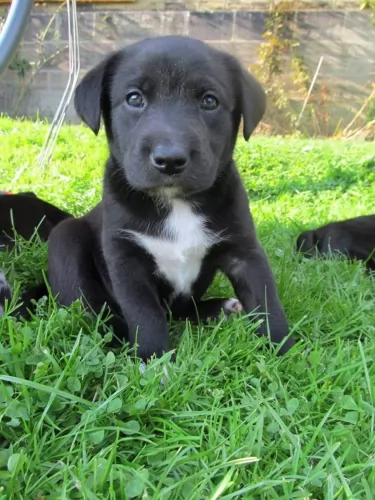 The Borador is a medium to large sized working dog which is well well-proportioned and muscular. His size can’t be carved in stone, but generally he will be in size from 40 – 57cm and weight in the region of 18 and 26 kg. His coat can vary significantly, leaning more towards one particular breed than the other. So the coat can be short and smooth or long and wavy or straight.
The Borador is a medium to large sized working dog which is well well-proportioned and muscular. His size can’t be carved in stone, but generally he will be in size from 40 – 57cm and weight in the region of 18 and 26 kg. His coat can vary significantly, leaning more towards one particular breed than the other. So the coat can be short and smooth or long and wavy or straight.
The Borador essentially has medium-sized ears which are floppy and the tail is medium-length. Sometimes the Borador will have the black and white coat of the Border Collie or he could have a brownish/beige colour from a golden Labrador.
He’s an Amicable Breed
When your energetic Borador is trained and socialized, he becomes a great family member and he gets on well with children and other pets.You’ll find that he often has the sweet, amicable temperament of the Labrador while having the sharp, alert intellect of the Border Collie.
Most Boradors are also good watchdogs and will bark at strangers, but because they are so amicable, from barking, they can quickly become a stranger’s friend.
The first generations of the Beabulls are a 50-50 mix, but most of the breed today are multigenerational dogs. This means a Beabull is mixed with another Beabull to try to create a purebred over time. Most of the Beabulls are a mixture and are very unpredictable in their looks and characteristics, depending upon which of the original parent breeds they favor most.
Many will retain the wrinkles, short legs, underbite and short tail of the Bulldog. Others will have the long droopy ears and long muzzles of the Beagle. Most will have coarse, short coats and shed quite a bit. They are medium to large depending upon which size Beagle is used in the crossing.
Characteristics
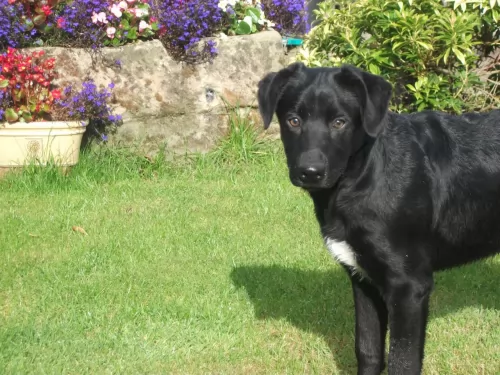 The Borador is an intelligent dog that can be trained. He is a sociable dog and is friendly to all members of his human family, willing to extend a paw of friendship to strangers as well.
The Borador is an intelligent dog that can be trained. He is a sociable dog and is friendly to all members of his human family, willing to extend a paw of friendship to strangers as well.
The Borador is also a friend of children and other pets. This combination of breeds is very energetic and you can’t just leave him for days on end in the backyard. He will need exercise and walks as well as ball games. When you become involved in his games, you tighten the bond between you and this is what this social, outgoing dog loves.
The Borador is going to make a wonderful pet because he is a mix of two very popular dog breeds. Give him all he deserves as a member of your family and you’ll have the perfect friend and companion for life.
1.Children friendliness – Very good with children.
2.Special talents intelligent and many with a great sense of smell.
3.Adaptability – They can live anywhere in an apartment or a home with a yard.
4.Learning ability – Very intelligent but with a stubborn, independent streak that is inherent in both parental breeds.
Health Problems
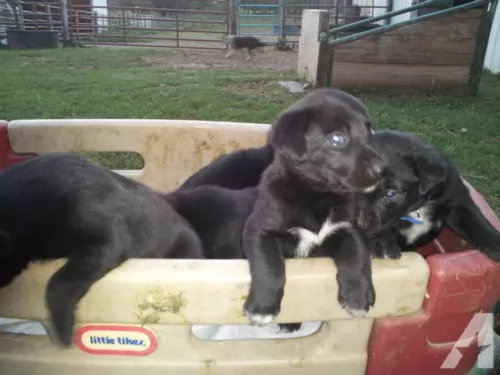 You won’t find serious health problems with your Boradors, as he is a robust breed. Nonetheless, there are some ailments that as a dog owner, you need to be aware of for your Borador.
You won’t find serious health problems with your Boradors, as he is a robust breed. Nonetheless, there are some ailments that as a dog owner, you need to be aware of for your Borador.
Skin ailments – you don’t want to see your dog scratching or licking continuously so you want to be aware of things like parasites and allergies. Skin diseases can be debilitating for a dog and can even require lifelong treatments. Yes, corticosteroids can help with itchy rashes, but the best move is to try and avoid skin ailments by ensuring a nutritious diet rich in minerals and vitamins and which includes some raw meat.
Always be checking your pet for skin problems such as ringworm, caused by a fungus and found on your dog and which appear as scaly patches and hair loss.
Hip Dysplasia – an inherited problem with the hip joints. No-one can predict when hip dysplasia settles in, but it can be as early as 4 months of age.Your dog shows signs of stiffness and may not be his energetic self. Some dog owners want to see certificates first that the parents of puppies have been hip-cleared before they buy a puppy.
Although most Beabulls will not have inherited health problems there are some issues they are all prone to:
• Bloat – can be fatal if not addressed immediately – inverted digestive organs.
• Hip Dysplasia – can cause lameness.
• Canine Disk Disease – can cause paralysis, loss of legs.
• Hypothyroidism
• Ear infections – keep them clean.
• Patellar Luxation – floating kneecaps – can cause lameness.
• Reverse Sneezing
Caring The Pet
Grooming
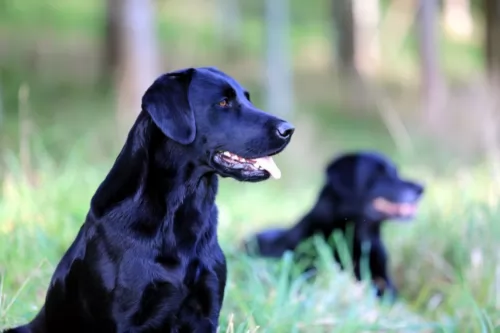 The Borador may have inherited the moderate shedder characteristics of the Border Collie or the more intense shedding of the Labrador Retriever. He will require a good brush at least twice a week to ensure you remove loose hairs so as to keep his coat shiny and healthy. Check your dogs ears too for yeast infections.
The Borador may have inherited the moderate shedder characteristics of the Border Collie or the more intense shedding of the Labrador Retriever. He will require a good brush at least twice a week to ensure you remove loose hairs so as to keep his coat shiny and healthy. Check your dogs ears too for yeast infections.
Feeding
Puppies and young Boradors are full of energy and they will require a diet that has an excellent protein content. If you’re unsure about how to feed your Borador, speak to your vet as some dogs need more calories depending on their level of activity.
Certainly if your dog has allergies, you may have to look for a special diet but otherwise a top brand commercial dog food can be a good choice if you include some home prepared food such as rice, vegetables and meat. It is important to give your dog some raw meat every now and then as well. Always have a bowl of cool, fresh water available for your pet 24/7.
1.Feeding the puppy – Don’t overfeed due to tendency for obesity and don’t feed right before or after exercise due to threat of bloat. Feed 3-4 meals per day a total of 1.5 cups in a day.
2.Feeding the adult - Don’t overfeed due to tendency for obesity and don’t feed right before or after exercise due to threat of bloat. Feed 3-4 meals per day a total of 3 cups in a day.
3.Points for Good Health no hereditary issues
4. Games and Exercises – both the laziness of the Bulldog and the scent driven energy or the Beagle can be seen in the Beabull. They have short bursts of the Beagles hyperness. Enjoy playing fetch and participating in agility. They need a daily 45-60 minute walk.
Comparison with other breeds
- Borador vs English Bulldog - Breed Comparison
- Borador vs German Shepherd - Breed Comparison
- Borador vs Golden Retriever - Breed Comparison
- Borador vs Labrador Retriever - Breed Comparison
- Borador vs West Highland White Terrier - Breed Comparison
- Borador vs French Bulldog - Breed Comparison
- Borador vs Beagle - Breed Comparison
- Borador vs Yorkshire Terrier - Breed Comparison
- Borador vs Poodle - Breed Comparison
- Borador vs Rottweiler - Breed Comparison
- Borador vs Boxer - Breed Comparison
- Borador vs English Pointer - Breed Comparison
- Borador vs Siberian Husky - Breed Comparison
- Borador vs Doberman Pinscher - Breed Comparison
- Borador vs American Bully - Breed Comparison
- Borador vs Abruzzenhund - Breed Comparison
- Borador vs Affenpinscher - Breed Comparison
- Borador vs Afghan Hound - Breed Comparison
- Borador vs Aidi - Breed Comparison
- Borador vs Airedale Terrier - Breed Comparison
- Borador vs Akbash Dog - Breed Comparison
- Borador vs Akita - Breed Comparison
- Borador vs Africanis - Breed Comparison
- Borador vs Askal - Breed Comparison
- Borador vs Atlas Terrier - Breed Comparison
- Beabull vs English Bulldog - Breed Comparison
- Beabull vs German Shepherd - Breed Comparison
- Beabull vs Golden Retriever - Breed Comparison
- Beabull vs Labrador Retriever - Breed Comparison
- Beabull vs West Highland White Terrier - Breed Comparison
- Beabull vs French Bulldog - Breed Comparison
- Beabull vs Beagle - Breed Comparison
- Beabull vs Yorkshire Terrier - Breed Comparison
- Beabull vs Poodle - Breed Comparison
- Beabull vs Rottweiler - Breed Comparison
- Beabull vs Boxer - Breed Comparison
- Beabull vs English Pointer - Breed Comparison
- Beabull vs Siberian Husky - Breed Comparison
- Beabull vs Doberman Pinscher - Breed Comparison
- Beabull vs American Bully - Breed Comparison
- Beabull vs Abruzzenhund - Breed Comparison
- Beabull vs Affenpinscher - Breed Comparison
- Beabull vs Afghan Hound - Breed Comparison
- Beabull vs Aidi - Breed Comparison
- Beabull vs Airedale Terrier - Breed Comparison
- Beabull vs Akbash Dog - Breed Comparison
- Beabull vs Akita - Breed Comparison
- Beabull vs Africanis - Breed Comparison
- Beabull vs Askal - Breed Comparison
- Beabull vs Atlas Terrier - Breed Comparison
 Petzlover
Petzlover Both Borador and Beabull are originated from United States. Borador may grow 17 cm / 7 inches higher than Beabull. Borador may weigh 13 kg / 29 pounds more than Beabull. Borador may live 4 years more than Beabull. Borador may have more litter size than Beabull. Both Borador and Beabull requires Moderate Maintenance.
Both Borador and Beabull are originated from United States. Borador may grow 17 cm / 7 inches higher than Beabull. Borador may weigh 13 kg / 29 pounds more than Beabull. Borador may live 4 years more than Beabull. Borador may have more litter size than Beabull. Both Borador and Beabull requires Moderate Maintenance.  Hybrid breeds have become popular in the last decade or so. The Borador, hailing from Northern America, is one of these popular crossbreeds between two very popular dog breeds - the Border Collie and the Labrador Retriever. Between the two dog breeds, you get extraordinary intelligence, energy and a wonderful temperament.
Hybrid breeds have become popular in the last decade or so. The Borador, hailing from Northern America, is one of these popular crossbreeds between two very popular dog breeds - the Border Collie and the Labrador Retriever. Between the two dog breeds, you get extraordinary intelligence, energy and a wonderful temperament. The Borador is a medium to large sized working dog which is well well-proportioned and muscular. His size can’t be carved in stone, but generally he will be in size from 40 – 57cm and weight in the region of 18 and 26 kg. His coat can vary significantly, leaning more towards one particular breed than the other. So the coat can be short and smooth or long and wavy or straight.
The Borador is a medium to large sized working dog which is well well-proportioned and muscular. His size can’t be carved in stone, but generally he will be in size from 40 – 57cm and weight in the region of 18 and 26 kg. His coat can vary significantly, leaning more towards one particular breed than the other. So the coat can be short and smooth or long and wavy or straight.  The Borador is an intelligent dog that can be trained. He is a sociable dog and is friendly to all members of his human family, willing to extend a paw of friendship to strangers as well.
The Borador is an intelligent dog that can be trained. He is a sociable dog and is friendly to all members of his human family, willing to extend a paw of friendship to strangers as well. You won’t find serious health problems with your Boradors, as he is a robust breed. Nonetheless, there are some ailments that as a dog owner, you need to be aware of for your Borador.
You won’t find serious health problems with your Boradors, as he is a robust breed. Nonetheless, there are some ailments that as a dog owner, you need to be aware of for your Borador. The Borador may have inherited the moderate shedder characteristics of the Border Collie or the more intense shedding of the Labrador Retriever. He will require a good brush at least twice a week to ensure you remove loose hairs so as to keep his coat shiny and healthy. Check your dogs ears too for yeast infections.
The Borador may have inherited the moderate shedder characteristics of the Border Collie or the more intense shedding of the Labrador Retriever. He will require a good brush at least twice a week to ensure you remove loose hairs so as to keep his coat shiny and healthy. Check your dogs ears too for yeast infections.